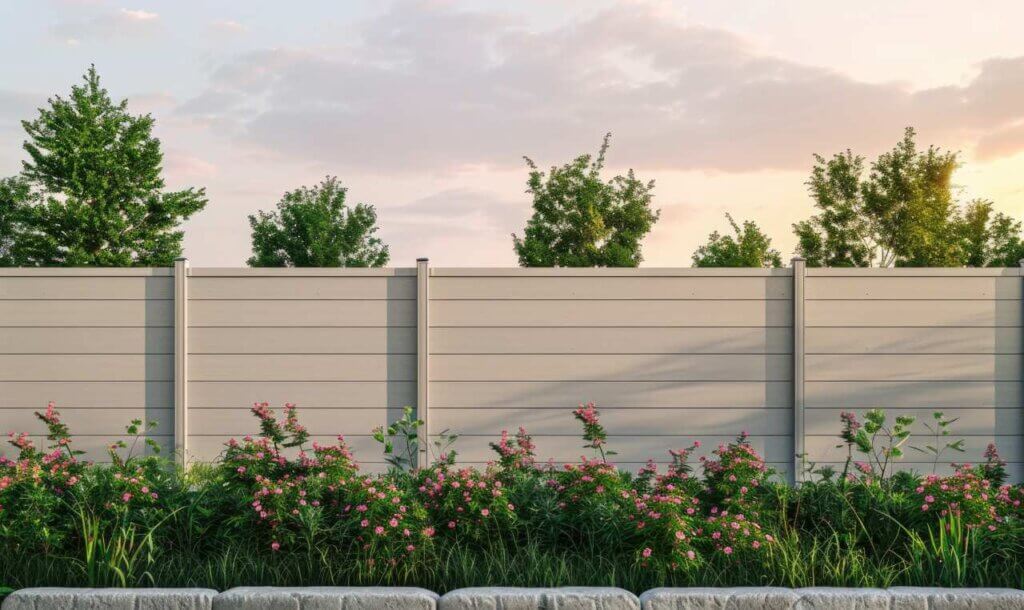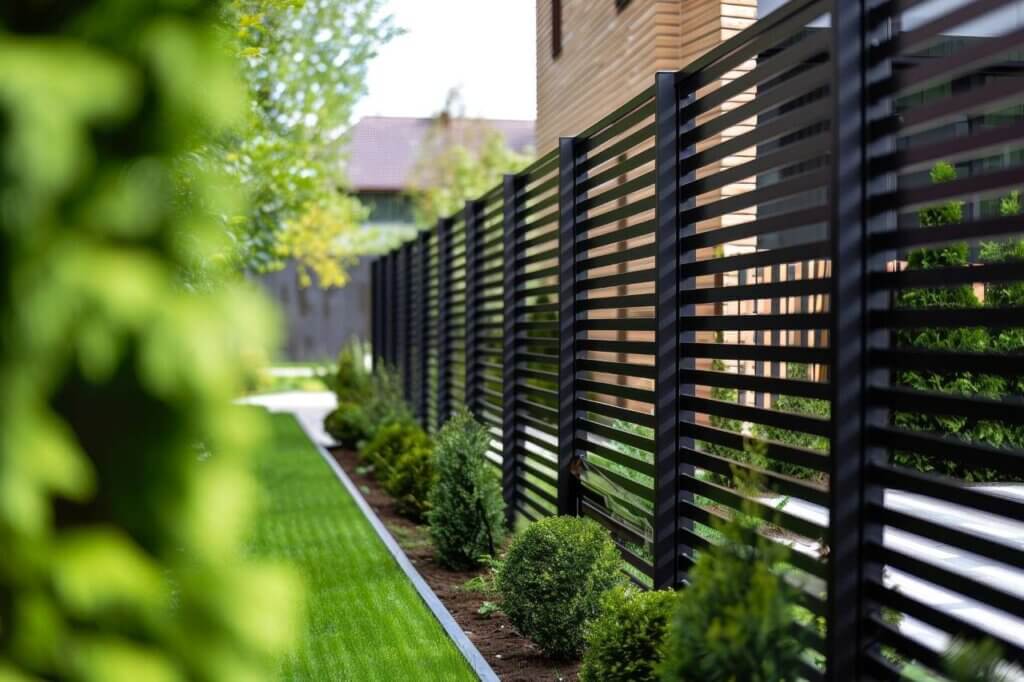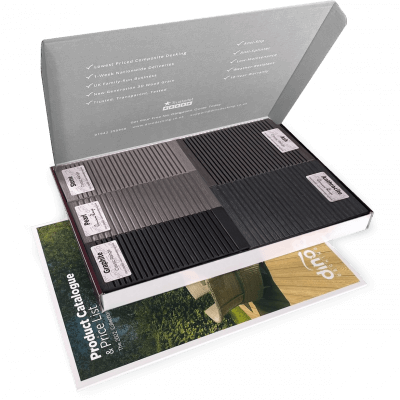5 Composite Decking Lighting Ideas
Our composite decking looks great in any setting, but you can really make your outdoor spaces shine with our decking
Products in Stock
Lowest Prices
Express Delivery
10-Year Warranty
Early April Sale. Up To 15% Off.

When it comes to fencing, strength matters. It doesn’t matter whether you’re looking to secure your property, keep pets in (or wildlife out), or if you simply want a fence that can withstand the test of time, the bottom line is simple; the material you choose matters.
So, what’s the strongest type of material to use to fence your home? Let’s take a look.
Now, you might be thinking, “Composite fencing? Really?” But hear us out – composite fencing is a game-changer in the world of strong, durable fencing materials.
Composite fencing is engineered to combine the best qualities of wood and plastic, resulting in a material that’s incredibly strong and resistant to the elements. It doesn’t warp, rot, or splinter like wood, and it’s far more durable than vinyl. Plus, it can withstand extreme weather conditions without incurring any damage.
One of the most impressive things about composite fencing is its longevity; while other fencing materials might start showing their age after a few years, composite fencing can look great for a decade. We’re talking 10+ years or more with minimal degradation. How’s that for a long-term investment?
Here’s where composite fencing really shines: unlike other strong fencing materials that require regular upkeep, composite fencing is virtually maintenance-free. No painting, no staining, no replacing rotted boards. Just give it a quick wash now and then, and you’re good to go.
At Dino Decking, we offer high quality composite fence panels in the UK in a wide range of styles and colours. And even if you’re not sure whether or not you’re ready to make the investment, you can order a free sample kit including all of our boards to test them out. Go on – with no charge and free next-day delivery across the UK, what do you have to lose?!
Back to our list, steel is often considered the heavyweight champion of fencing materials, but how does it really stack up when factoring in other elements such as durability and maintenance?
There’s no denying that steel is incredibly strong; it can withstand high winds, impacts, and even attempted break-ins. Generally speaking, if security is your top priority, steel fencing is definitely worth considering, especially for commercial premises.
Like composite fencing, steel fencing can last for decades, especially if you’re vigilant with its upkeep. However, if you live in a particularly rainy or windy part of the UK (hello Scotland!), it may require more frequent maintenance to keep it in top shape.

While steel is strong, it’s not maintenance-free; you’ll need to keep an eye out for rust and repaint or touch up the coating every few years to keep it looking its best.
Also Read: 10 Modern Fence Ideas for Your Home
While wrought iron fencing might sound like something you’d see around a 17th century castle, it’s actually popular option for many homeowners:
When it comes to strength, wrought iron is incredibly resistant. It’s also very difficult to climb, which is a massive plus if you’re looking for a fence for security concerns. Wrought iron can also be forged into intricate designs, making it both secure and aesthetically pleasing.
With proper care, wrought iron fencing can last for 60-100 years; in fact, it’s not uncommon to see wrought iron fences that are over a century old and still going strong.
The downside of wrought iron is that it requires regular maintenance to prevent rust. You’ll need to repaint it every few years and keep an eye out for any signs of corrosion.
Aluminium might not be the first material that comes to mind when you think of strength, but it’s actually a solid contender:
While not as strong as steel, aluminium is still very durable and has the added benefit of being naturally rust-resistant. It’s also lightweight, which makes it easier to install.
Aluminium fencing can last for decades with minimal maintenance, and as we mentioned above, it doesn’t rust, rot, or warp, so it’s a great long-term option.
One of the big advantages of aluminium fencing is its low maintenance requirements; a simple wash with soap and water is usually all it needs to remain looking great.
Vinyl fencing has gained popularity in recent years, but how does it measure up in terms of strength?
While not as strong as metal options, high-quality vinyl fencing is surprisingly durable. It’s flexible enough to withstand high winds and impacts without breaking, and it’s resistant to rot, insects, and UV damage.
Vinyl fencing can last for 10+ years or more with minimal degradation. It doesn’t fade, peel, or rot like wood fencing.
Like composite fencing, vinyl is very low maintenance. It doesn’t need repairing or staining, and a simple wash now and then is usually all it needs to keep looking fresh.
So, what’s our verdict on the strongest type of fencing? While traditional materials like steel and wrought iron certainly have their strengths, it’s hard to beat the combination of durability, longevity, and low maintenance offered by modern composite fencing.
When you factor in the long-term costs of maintenance and potential replacements, composite fencing often comes out on top as the smartest choice for homeowners looking for a strong, long-lasting fence. It offers the aesthetic appeal of wood, the strength of engineered materials, and the peace of mind that comes with knowing your fence will stand strong for decades to come.

Our sample pack contains a sample piece of each colour currently available. Order your free sample pack today to compare the colours and get a true feeling of the Dino Decking range!
Our composite decking looks great in any setting, but you can really make your outdoor spaces shine with our decking
If the idea of having rats under your decking makes you shiver, don’t worry. We’ll let you know the signs
Business hours
Monday: 09:00 – 17:30
Tuesday: 09:00 – 17:30
Wednesday: 09:00 – 17:30
Thursday: 09:00 – 17:30
Friday: 09:00 – 17:30
Saturday: Closed
Sunday: Closed
Contact us
01942 355968
support@dino.co.uk
Collection Address: Unit 1 Wetheral Close Hindley Ind Estate Wigan Greater Manchester North West WN2 4HS
Pages
Products
Testing
Copyright 2025 Dino Decking Ltd All Rights Reserved.
VAT Number: GB296097848.
Company Number: 10837233.